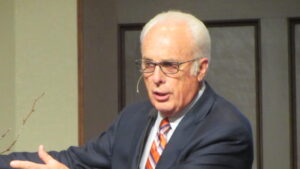Louie Vassalos has written a four-part series on being good for the sake of God. He aims to show that believing in God is necessary for us to be truly good. While this may sound obvious, many secular objectors argue that God’s existence does not matter in determining whether a person is good or not.
The current article is part 2 of 4. To read the first part, click here.
We cannot talk about what kind of individual exhibits truly good behavior unless we have language that can adequately explain goodness itself. In other words, for objective moral values to be rationally sound, they require a firm (ontological) grounding – not unlike in the construction of a structurally sound house. They stand on a foundation – one that is strong enough to bear the weight of the object that rests on it.
When the billboard Santa says “be good” (see Part 1), he is not stating a personal preference (or a corporate one since he represents an organization); he is issuing an injunction. His lighthearted tone does nothing to diminish the imperativeness of the directive. What peculiar sort of fellow puts any energy into a sign telling people to enjoy apples simply because of his fondness of apples? Unless he’s trying to unload inventory from his orchard or has some other self-interested goal in view, he just sounds idiosyncratic. An exhortation to “be good” is unspoken shorthand for “you should be good”. Uses of ‘should’ or ‘ought’ convey objective claims to moral duties between separate entities. By contrast, declarations devoid of objective content (i.e., subjective statements) are merely suggestions by one entity that is morally impotent to compel another entity to act in accordance with them.
To be meaningful, in an objective sense, axiological statements must have the force of obligating a moral agent to either perform a prescribed action or prohibit him from carrying one out. If that force is not sufficiently authoritative, by what right may any human impose his personal convictions on other humans? If moral obligations aren’t grounded in a transcendent Person who is rightly authorized in and of himself (since he alone is the author of all created things) to hold us accountable for them then we are not justified in making absolute moral pronouncements. We have no warrant to say things like, “striving to eliminate poverty is objectively good” or that “racial oppression has and will always be bad, in all places and for all peoples”.
My underscoring “Person” was intended to demarcate moral obligations as the province of personal relationships – owed exclusively to persons, not things. I am never obligated to be good to my dishes. Whether I wash them or break them is of no consequence, ethically. Moreover, goodness is not some abstract object like a Platonic form or ideal to which I must adhere. This would be as meaningless and ineffectual as imploring someone to do something ‘for the love of love’. Rather, goodness must inhere in a Person, residing in his very character as an aspect of his being. And if goodness is a property of that Person then it would be incumbent upon any moral agent that this Person chooses to create to operate in accordance with that goodness.
Objectively binding moral obligations can’t rightfully be imposed from within the human community, regardless of consensus by any arrangement of individuals in that community. They must come from a source external to the community (i.e. not derived from but independent of the community). That source would have an authoritative claim on the community because it would have constituted the community. It would also have an immutable nature without which moral imperatives are subject to change over time. The only qualified candidate, with no conceivable substitute capable of satisfying the requirements for grounding objective morality, is God. Only his character – his intrinsically good nature – establishes the basis for why all people are properly obligated to be good.
I imagine some atheists by now raising the objection, “How can you say that atheists need God to be good?” to which Christians could reply, “I’m not saying you can’t be a good atheist unless you believe in God. I’m reasoning that if you accept the reality of objectively binding moral values you can’t provide a coherent explanation for how to derive them without reference to God”. This boils down to: You need God as an explanation for morals but you don’t need to believe in God to be moral. It is on this point that I, somewhat equivocally, part ways with some of my brethren. I think that belief in God is a necessary precondition for being good (which I address in the next installment of this series).
Given the stringent requirements upon which to base objective moral values, it seems necessary to posit the existence of a transcendent personal being as their source. Contrary to being superfluous – as atheism would have it – only a personal God who is by his very nature good fits the bill. Anything less relegates morality to the subjective realm of desires and preferences that invariably differ from one individual to the next.




















